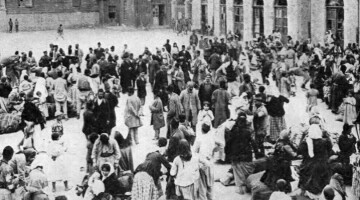Speaking at the traditional Easter Rising commemoration (celebrating the Proclamation of the Irish Republic in 1916), Michelle O’Neill, Deputy First Minister in the North of Ireland Assembly, remarked that “The ending of partition, and shaping a new and agreed Ireland between Orange and Green, remains the only political solution for everyone on this island concerned with its future”.
O’Neill underlined that “Over the past two decades Ireland has been transformed as a result of the peace process. And the Good Friday Agreement has been its cornerstone”.
The Agreement, she said, “provides for a peaceful and democratic way to end partition and unite the country. When it was signed 20 years ago it offered hope of a new future. It recognised that the constitutional and political conditions of the North had to fundamentally change. No longer could the British/unionist state deny nationalists equality of opportunity, parity of esteem, recognition of our Irish national identity or political power”.
Today, twenty years on, the Good Friday Agreement is under attack by some within the DUP and the British Tory party. “Because - said O’Neill - they did not sign up to it, don't believe in what it represents, parity of esteem; equality and mutual respect for all in this society”.
The Assembly election last March was brought to a head by the lack of respect and arrogance of the DUP towards the Irish nationalist/republican people. The DUP sought to set aside the principles of equality and respect. They were involved in financial scandals which undermined public confidence in the institutions. “They insulted - O’Neill underlined - broad nationalism, Irish language speakers, ethnic minorities and our gay and lesbian brothers and sisters”.
No doubt this 20th anniversary provides the opportunity to both remember the achievements of 1998 while at the same time throwing up some difficult questions about the present.
The UK is leaving the European Union and will need to come up with a plan for the border between Ireland and Northern Ireland. But the very absence of a border has been an integral element of life after the Good Friday Agreement. The fact that there hasn’t been a devolved government for over a year as a result of the reactionary and arrogant attitude of the DUP, rises even more questions as to the DUP really wants to move on.
And indeed Sinn Fein reiterated that “standing still is not an option”. For this, Michelle O’Neill has stressed that “the onus is now on the two governments, - to act. They must reaffirm their support for the full implementation of agreements and, in the absence of an Executive, establish the British-Irish Intergovernmental Conference”.
Times ahead are going to be difficult, yet Sinn Fein repeated its commitment to work towards a full national reconciliation.
Republicans and Unionists have conflicting narratives, conflicting histories and conflicting allegiances. That's a reality. “Part of the journey to reconciliation is about recognising that to be the case. - said O’Neill - Much hurt has been caused and real pain inflicted on all sides of the community. It takes time to heal those wounds and to build a new society together where we respect each other. The whole point in having joint heads of government in the Executive is because there is a responsibility on the two main political leaders to bridge the divide between us and those we represent”.
To complicate things further is the result of the Brexit referendum, won by those who want to leave the EU. Except in the North of Ireland the majority of people voted to stay in the EU, which caused no little problems as to how an arrangement could be found that would not jeopardise relations between the North of Ireland and the Republic.
“Ending partition - said O’Neill - has now taken on a new dynamic because of Brexit. The Good Friday Agreement's political institutions, human rights guarantees, all-Ireland bodies, the constitutional and legal right of the people to exercise their right to self-determination and a united Ireland through consent, must all be protected”.
No doubt Brexit also exposes the undemocratic nature of partition. Sinn Fein believes there should be a referendum vote on Irish unity within the next five years, as it thinks now is the time to plan a new, agreed and united Ireland, in which all identities and traditions have a place and the opportunity to contribute to our shared nation.
Ireland is indeed entering a defining period in its political history. The opportunities for real change are within grasp, as Michelle O’Neill reminded because “the old certainties are gone. The grip of the old parties is loosening. The perpetual unionist majority has ended. Europe is in a state of flux”.
As former President of Sinn Fein, Gerry Adams, said: “this is a time for big ideas. Now is the time to build a New Ireland. Now is the time to deliver a real Republic”.













